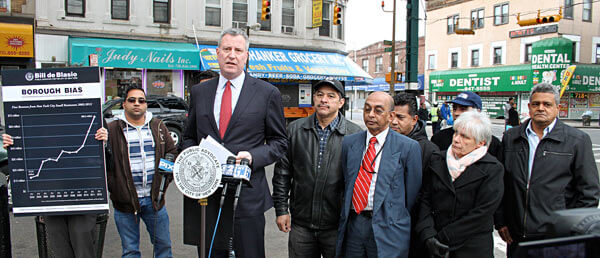By Joe Anuta
City Public Advocate Bill de Blasio stood in Richmond Hill Monday and blasted the Bloomberg administration for issuing a disproportionate number of fines to small businesses in Queens while sparing Manhattan stores.
De Blasio stood near the corner of Jamaica Avenue and 117th Street, an area where businesses paid three times the amount of city Department of Consumer Affairs fines compared to the citywide average throughout the tenure of Mayor Michael Bloomberg, according to a report released by the public advocate.
“When he sees these stores, he sees dollar signs,” said de Blasio, who is running for mayor.
The public advocate’s office released the report last week, which showed the fines issued by Consumer Affairs and the city Department of Health increased from $12.6 million in 2002 to $66.2 million in 2012.
The public advocate’s report accused Bloomberg of compensating for the global financial crisis and revenue shortfalls by “filling budget gaps on the backs of outerborough businesses.” But the $66 million raised by the departments accused of bias in the report accounts for less than 0.1 percent of the city’s total revenues.
Nevertheless, the report showed that Queens businesses were 16 percent more likely to be inspected than Manhattan businesses by Consumer Affairs. It also showed Queens businesses received 22 percent more Consumer Affairs fines than Manhattan businesses, and that eight of the most heavily fined ZIP codes fined by the agency are in southeast Queens. The areas include St. Albans, Springfield Gardens, Cambria Heights, South Ozone Park, Jamaica, Rosedale and Richmond Hill.
“We have been targeted,” said Vishnu Mahadeo, of the Richmond Hill Economic Development Council, who stood with other Richmond Hill business owners to denounce what they characterized as excessive enforcement on the part of Bloomberg inspectors.
Andy Jarbandhan owns a fruit shop in the neighborhood and said he was hit with a $7,000 fine for having three boxes of fruit sitting directly on the floor.
He and de Blasio characterized the increase in enforcement as a hidden tax.
But Bloomberg, speaking at a recent unrelated new conference shortly after the report was released, said there is a distinct line between a tax and a fine.
“Fines are easy to avoid,” he said. “Just don’t do what we are trying to prevent you from doing.”
While the departments’ small businesses fines made up only a fraction of the city’s total revenue, it constituted nearly 10 percent of the amount the city takes in for fines and fees.
The city Departments of Buildings, Finance, Sanitation and Transportation also issue fines and fees, according to the public advocate’s office, and they have been going up as well.
According to numbers from the city comptroller’s office, the city took in $485 million from fines and fees in 2002, but by 2012 this revenue had grown by 61 percent to about $783 million.
Reach reporter Joe Anuta by e-mail at januta@cnglocal.com or by phone at 718-260-4566.




































